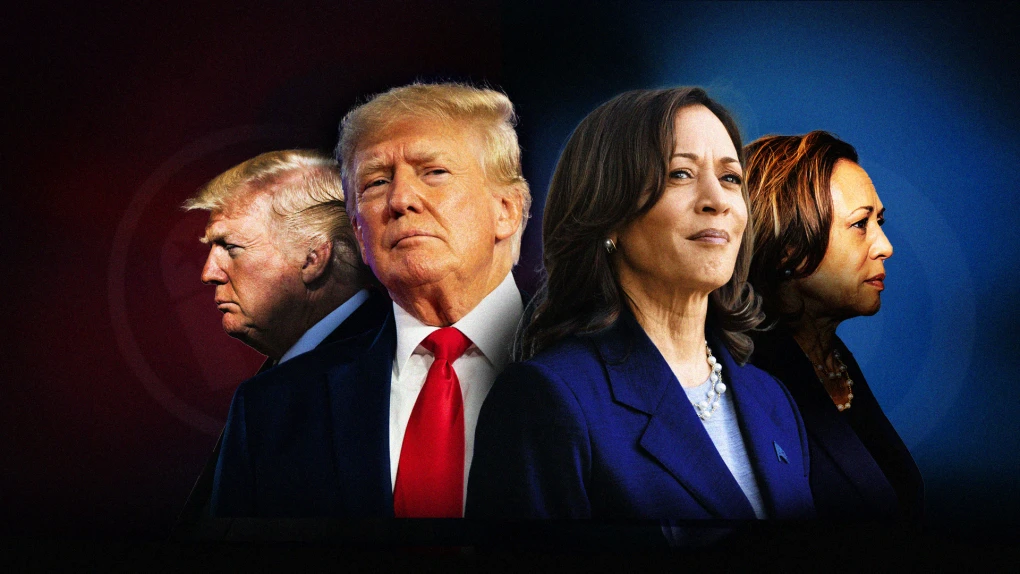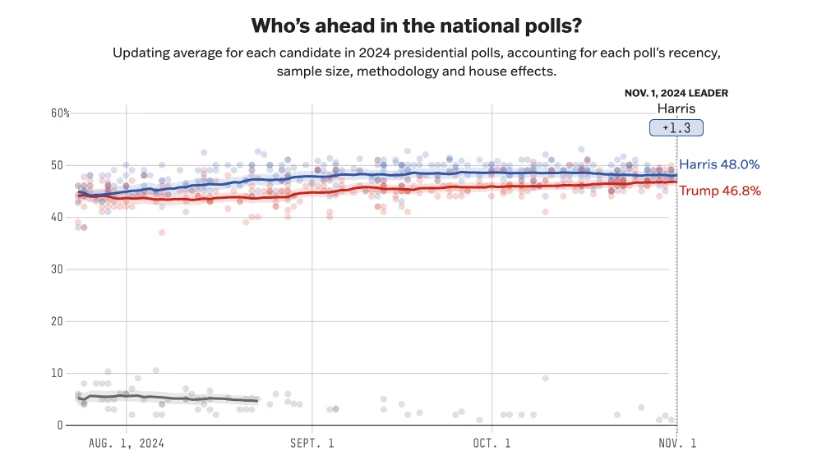Một bài đọc phải đọc trước cuộc bầu cử Hoa Kỳ: Dưới đây là tất cả những diễn biến bất ngờ mà bạn cần biết
Bản gốc|Odaily Planet Daily
Tác giả: jk
November 5th is the presidential election day in the United States, and it will also be a day that will profoundly affect the world situation in the next four years. In this upcoming US election, voters choices will affect the direction of US policies, Chinas policy response, and the trend of mật mãcurrencies and stock markets.
This post will provide a detailed introduction to the election mechanism, timeline, winning rate, and public opinion on them. Through these analyses, whether you are a passionate spectator of the election or an investor interested in the cryptocurrency market, you will have a deeper understanding of the current political situation and its potential impact on the future economy.
Background: Why did Trump win the US presidency despite having fewer votes in 2016?
The US presidential election is held every four years. First, each state holds a primary or caucus, where voters vote for the candidate they support. Based on the results of the primary, each major party holds a national convention to formally nominate their candidates. The current leading candidates are Donald Trump of the Republican Party and Kamala Harris of the Democratic Party.
The official presidential election takes place on the first Tuesday in November (this year, November 5th, local time in the United States). In this election, voters actually vote for electors (similar to popular representatives) instead of directly voting for one of the two candidates. Each state allocates electors based on its population, with a total of 538 electors for the entire country. Most states use a winner-takes-all system, which means that the candidate who receives the most votes in a state receives all of the electoral votes in that state.
Here is the first point to note in the US election: In the US presidential election, voters vote for electors, who usually represent a specific party. The electors political stance and whether they support Trump or Harris are generally clear before the election. Therefore, the results of voters voting often directly reflect which candidate will receive the support of the majority of electors, or even all the candidate votes in the state, which is what we traditionally call the red state and blue state.
For example, if Elector A representing the Democratic Party in California receives the most popular votes in the state, then all of Californias electoral votes (a total of 55 electoral votes) will go to Democratic candidate Harris, regardless of the political positions of the other electors.
Therefore, by counting the distribution of electoral votes in November, it is usually possible to predict with some accuracy the candidate who will eventually become president, and we will see the results next week.
In order to be elected president, a candidate needs to receive at least 270 electoral votes. The results of the election are usually formalized in December at the Electoral College meeting, when the electors vote to select the new president. The second point to note is that while the electors generally vote according to the will of the voters (that is, their previously advertised political stance), in some cases, individual electors may choose to betray their candidate and vote for other candidates. Although this situation is relatively rare, it does exist, so in theory, the final vote of the Electoral College is not necessarily exactly the same as the vote of the voters.
In the 2016 US presidential election, Hillary Clinton received more popular votes, about 65 million votes, accounting for 48.2% of the total votes. Donald Trump received about 63 million votes, accounting for 46.1% of the total votes. Although Hillary Clinton led in the popular vote, Trump won more electoral votes and was eventually elected president with a result of 304 to 227.
This years final electoral results will be released around late night on November 5th local time in the United States, which is the afternoon of November 6th Beijing time.
Trump vs. Harris: What are the odds?
At present, in most of the polls predicted by authoritative institutions, whether it is media that lean towards the Democratic Party, media that lean towards the Republican Party, or neutral institutions, Harris still has an advantage, but the advantage is only one or two percentage points. According to statistics from the neutral media Project 538, the average of the current major polls shows that as of November 1, Harriss winning rate is 48.0% and Trumps winning rate is 46.8%. The results of other data statistics websites are not much different. For example, the results of the New York Times are Harriss 49% to Trumps 48%; the results of 270 towin are Harriss 48.4% to Trumps 47.2%.
Harris poll average leads by 1.3%. Source: Project 538
Previously, statistics from Fox News (a media that leans toward the Republican Party) and CNN (a media that leans toward the Democratic Party) also confirmed this conclusion.
This result is somewhat different from the current result of Polymarket, a representative of the crypto prediction platform; according to the article As the US election approaches, is Polymarkets data more reliable? previously published by Odaily Planet Daily, it can be seen that Trumps winning rate has been stable at around 60%, while Harriss is less than 40%. As of the time of this article, the total amount of the prediction market has reached 2.38 billion US dollars, Trumps winning rate has declined slightly, and Harriss winning rate has increased accordingly. It can be seen that the Polymarket market has been approaching the poll results in the past week, although Trump still firmly occupies the main position.
Presidential election predictions on Polymarket. Source: Polymarket
The latest news: Zuckerberg turns against Harris, and his Twitter account is blasted
Many interesting things have happened since the election. Musk and other business tycoons publicly supported Trump. Previously, Meta CEO Zuckerberg wrote an apology letter to the Republican Party, which set off the entire Internet.
According to Sina Finance, on August 26, Zuckerberg wrote a letter to Jim Jordan, the Republican chairman of the House Judiciary Committee, saying that he would remain politically neutral in this US election cycle and stop donating to local government elections to avoid being considered politically biased. Previously, he was generally considered to be a die-hard fan of the Democratic Party, and this letter may be his letter of allegiance to the Republican Party.
He also publicly criticized Biden administration officials for constantly pressuring Facebook in 2021 to censor posts related to the epidemic. Zuckerberg said he regretted the companys succumbing to these requests. Some people even believed that it was because he found a trend in Facebook, the center of public opinion, that he switched to the Republican Party.
When the letter was made public by the X account of the U.S. House of Representatives Judiciary Committee, it said: “Mark Zuckerberg admitted three things in this letter – first, the Biden-Harris administration ‘pressured’ Facebook to censor Americans; second, Facebook censored Americans; and third, Facekbook suppressed news about Hunter Biden’s laptop.” According to Bloomberg, the authenticity of the letter was confirmed by Meta.
Secondly, on the X platform today, debates are endless, and candidate Harris’ tweets are basically filled with posts scolding her. Under her latest post “I will be the president of all Americans”, the comments section is almost one-sided: “You will not be the president of any American”, “You will never be the president”, “You can’t even be the vice president of all Americans”, people below said.
Harris Twitter comment section, source: X
Almost all of Harris’ tweets have this style, which is somewhat similar to Trump’s in 2016. Some netizens believe that the only reason to choose Harris is that they “don’t like Trump.”
Meme Trends: Maybe Harris’ Meme Has a Chance?
Currently, the price of MAGA, the largest Trump-related meme coin, has remained between $3 and $4, with a small fluctuation range, as if it is waiting for the final election results to be announced. This sideways trend has lasted for about two weeks.
MAGA trend, source: Coingecko
On the other hand, Harris’ Meme coin concept has recently begun to rise. KAMA has risen by about 20% in the short term, from about $0.006 to about $0.0099 today. Its market value has also increased to $9.966 million. Although it is still a small witch compared to Trump, it may also be a reflection of the increase in this market. After all, Trump’s concept is relatively mature, and there are also major NFT concepts that attract hot money . Harris’ related concept space is relatively larger.
KAMA trend, source: Coingecko
Here, Odaily Planet Daily reminds readers that Meme fluctuates greatly, and this presidential election will be the largest fluctuation of the concept in the short term. Therefore, there is a high possibility of a Sell the news incident, that is, the victory of a certain candidate may not bring about the expected surge in Meme tokens, but a collective shipment of previous whale addresses. Please pay attention to the risks.
However, given the ever-changing international situation, unless there are greater events that disrupt expectations in the future, including but not limited to: electors betraying their parties, resulting in a change in the final election results in December compared to the settled results in November, a candidate and his or her party being found to have cheated in the election, rendering the results invalid, or the previous storming of the Capitol incident, or even a candidate following in Kennedys footsteps, the election results will be the final expected release of Đồng xu Meme in the short term.
Attached is a timeline of the US election so far
February 2: A judge in Washington, D.C., postpones Trump’s election interference trial inbất chấpnitely.
March 4: The U.S. Supreme Court unanimously rules in Trump v. Anderson that Colorado’s attempt to remove Trump from the ballot under the 14th Amendment is unconstitutional, along with Illinois and Maine.
May 30: Trump is found guilty of all 34 counts at a trial in New York, becoming the first U.S. president to be convicted.
July 1: The U.S. Supreme Court, in a 6-3 ruling in the Trump case, divides along ideological lines, ruling that Trump has absolute immunity for actions within his core constitutional powers, constructive immunity for official actions at least within the outer boundaries of his official responsibilities, and no immunity for unofficial actions. Trump’s sentencing date for his conviction in New York is pushed back from July to September 2024, and trial dates in Trump’s other cases may also be pushed back to review the applicability of the Supreme Court’s ruling.
Since July 1, more than 20 representatives have called on Biden to withdraw from the race.
July 13: Trump is assassinated and shot in the ear during a campaign rally in Butler, Pa. A bystander and the shooter are killed, and two others are injured.
July 15: The 2024 Republican National Convention opens in Milwaukee, Wisconsin. Trump announces U.S. Senator JD Vance as his vice presidential nominee, who is later confirmed as the Republican presidential nominee.
July 17: Biden says he would consider dropping out of the race if he is officially diagnosed with a medical condition. Biden later tests positive for the coronavirus.
July 21: Biden announces he is withdrawing from the race, initiating an emergency transition process to allow for the Democratic nomination. Vice President Kamala Harris announces she will run for president.
August 6: Kamala Harris announces Gov. Tim Walz as her vice presidential nominee.
September 15: Trump is shot while playing golf at the Trump International Golf Club in West Palm Beach, Florida. Trump is not injured in the incident and is evacuated by Secret Service agents.
Oct. 29: Biden responds to a comedian during a video call from Trumps Madison Square Garden rally by calling Trumps supporters garbage, prompting a rebuttal from Harris. This is seen by many as potentially damaging to the Democratic Partys efforts to attract undecided voters, while also marginalizing the large number of Americans who support Trump.
November 5 (first Tuesday in November): Election Day.
This article is sourced from the internet: A must-read before the US election: Here are all the twists and turns you need to know














Được rồi
betar